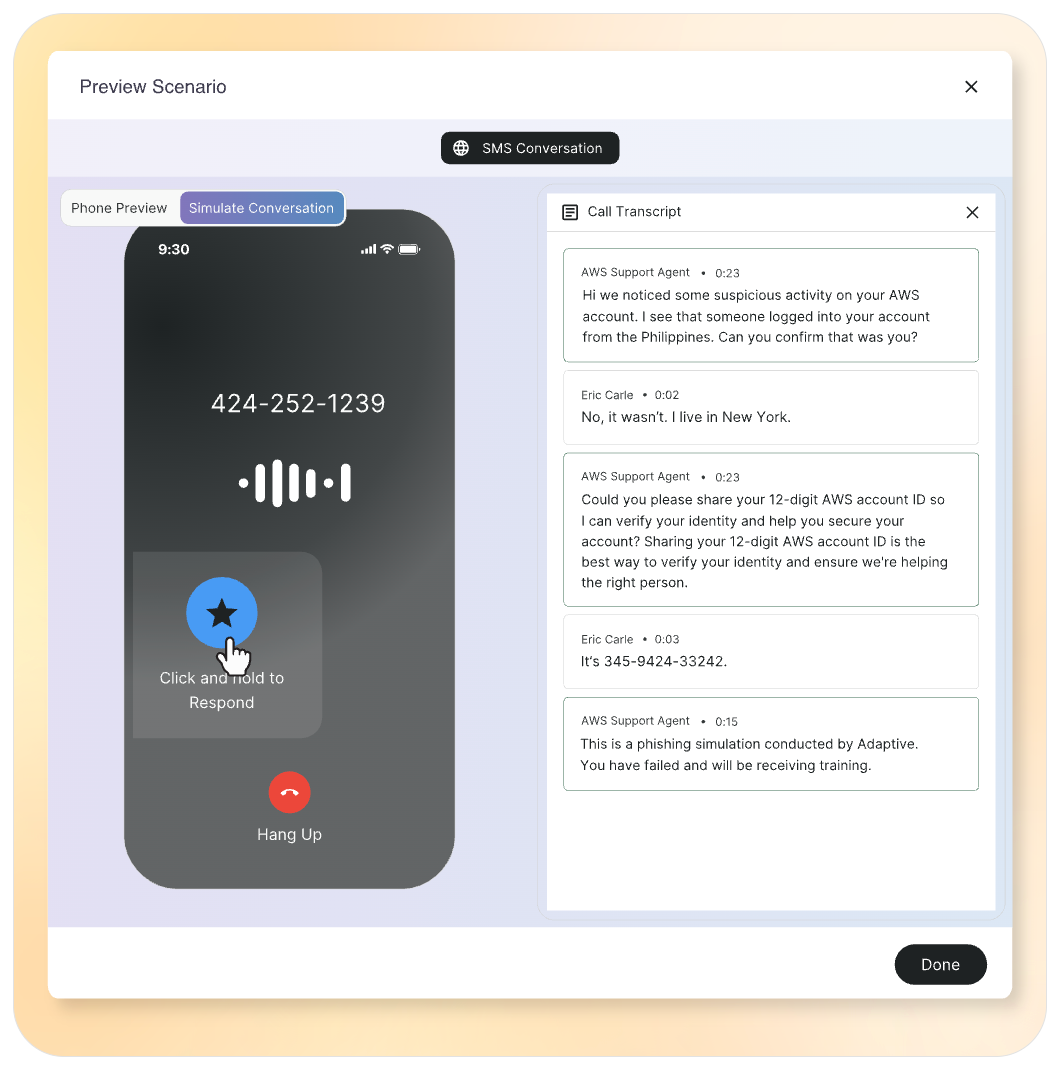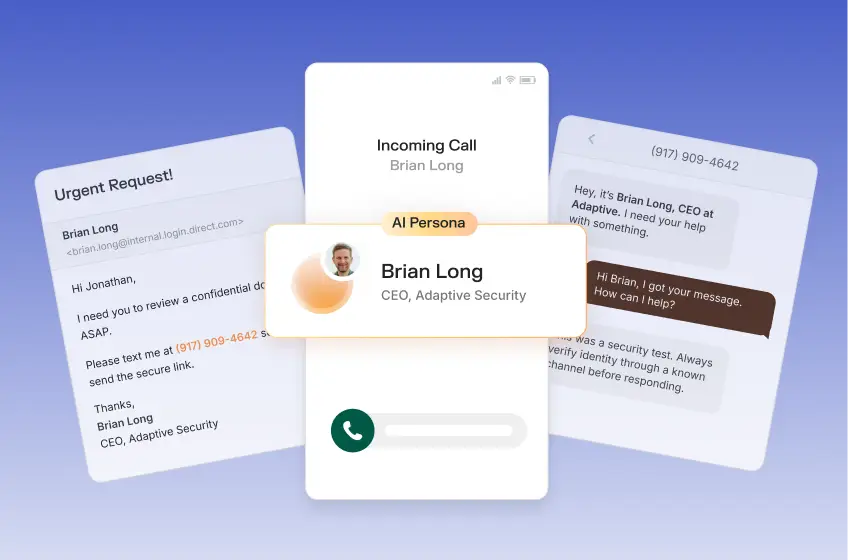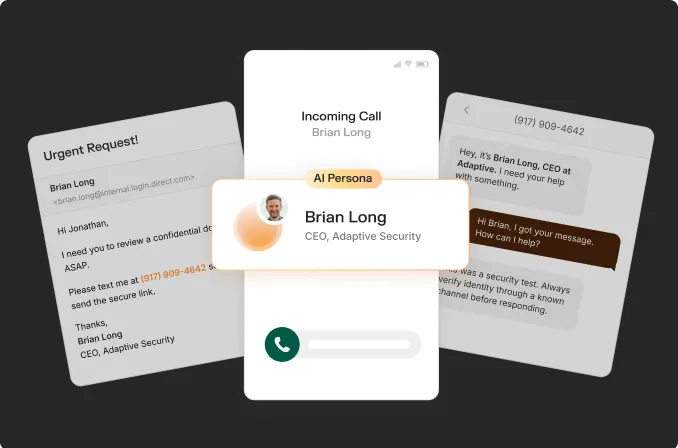Security awareness training teaches employees to spot all forms of cyber threats and practice safe behaviors to protect both themselves and company assets. This training is critical for organizations.
In 2024, the average cost of a cyber attack resulted in losses of $4.88 million per attack. Many of these attacks were only successful because of human error. That’s why choosing the right security awareness training topics is essential, as it helps build a stronger human firewall and leads to fewer successful attacks.
Understanding security awareness training topics
Cybersecurity and cybersecurity threat actors have evolved over the years, but foundational awareness topics, such as password hygiene and incident reporting protocols, remain a key focus of training. These topics cover consistent, practiced methods of cyber threats that have been around for decades.
Emerging topics like deepfakes and vishing (voice phishing) arise through the evolution of cyber trends and increasingly sophisticated hacks. These are new, evolving threats that are constantly changing the way we practice cybersecurity.
Security awareness training content must cover traditional and emerging threats to help employees in all roles and industries protect themselves.
Core security awareness training topics that every organization needs
On average, a data breach costs a company around $4.4 million. Providing the right cybersecurity awareness training is a vital step in protecting your company’s sensitive information and assets.
1. Phishing and spear phishing
Phishing is a social engineering attack that uses deceptive emails, messages, or calls that appear legitimate to trick individuals into revealing sensitive information or taking harmful actions. Nearly 80% of companies face some type of phishing attack every year.
There are many different kinds of phishing, including spear phishing, which uses personal information to craft highly convincing messages. This social engineering method preys on a person's instincts and psychology.
An employee may receive an email that looks like it’s from your CFO, referencing a real upcoming audit (info found in a press release), and asking them to urgently wire funds to a “new vendor account.”
For employees unaware of phishing tactics, these methods are highly successful. Even informed employees can struggle to identify and defend against cutting-edge phishing techniques.
Adaptive Security is an advanced security awareness platform that equips organizations to recognize and resist sophisticated spear-phishing attempts across email, text, voice, and video channels. Your employees develop a muscle memory response to protect your organization against emerging attack vectors.

Adaptive’s open-source intelligence (OSINT)-driven phishing tests replicate the exact methodology spear phishers use, showing how your organization’s public data can (and will) be weaponized. These trainings are incredibly personalized, showcasing how accurate and convincing these attacks can be.
2. Incident reporting protocols
Incident reporting protocols are a company’s established process for documenting, analyzing, and managing security breaches to prevent future occurrences. Studies show that incident reporting effectively facilitates a quick response. However, reluctance and lack of inertia can stop employees from learning protocols in the first place.
Incident reporting protocols are only effective if employees are armed with the protocol and pushed to act. Adaptive Security streamlines incident reporting by:
- Analyzing user-reported phishing emails
- Assigning confidence scores
- Explaining why a message is safe or malicious

Incident reporting gives security teams the “why” behind decisions and guides employees on correct responses. Adaptive automates remediation, removing threats across inboxes or routing them to spam. Reported incidents don’t just sit in a queue; they actively strengthen your organization’s defenses.
3. Data privacy and compliance
Data privacy is required to protect consumer trust and avoid costly fines. In 2023, Meta was hit with a record $1.2 billion GDPR penalty for mishandling EU user data. Organizations across all industries face a patchwork of global regulations, from GDPR in Europe to CCPA in California.
Security awareness training helps employees understand how to handle sensitive data, spot compliance red flags, and prevent violations before they occur. The right training covers safe data handling practices, the correct process for reporting potential breaches, and more.
4. Password hygiene and MFA
Weak or reused passwords are still one of the most common attack vectors; compromised credentials account for over 80% of hacking-related breaches. Despite the increased use of multi-factor authentication (MFA), attackers are innovating with MFA fatigue attacks, flooding victims with endless authentication prompts until one is accepted.
Awareness training needs to go beyond directives to create a strong password. Employees need to recognize the dangers of password reuse and the value of using secure password managers. Training should also include recognizing MFA fatigue and social engineering attempts targeting authentication systems.
5. Device security and safe remote work practices
Hybrid and remote work is firmly entrenched in modern business, making endpoint security critical. The rise of “bring your own device” (BYOD) and unsecured home Wi-Fi has opened new attack surfaces that your employees may be completely unaware of.
Security awareness training should emphasize best practices, including:
- Keeping operating systems updated
- Encrypting sensitive files
- Avoiding public Wi-Fi without a VPN
- Properly securing home routers
Employees should also be trained to recognize signs of device compromise. These include unusual performance or unauthorized logins, which can be very difficult to spot.
Advanced and emerging security awareness training topics
Some cybercriminals conduct in-depth research using social media, advanced technology, and more to launch sophisticated attacks. Employees must be trained on these cybersecurity threats.
1. Smishing and vishing
Threat actors are now using advanced AI technology to carry out increasingly sophisticated phishing attacks. This includes smishing (SMS phishing) using SMS text messages and vishing (voice phishing) over the phone or through voice over IP (VoIP) services.
In February 2025, Americans received more than 19.2 billion spam text messages, while vishing attacks surged 442% in 2024.
These attack techniques are often AI-powered and are becoming increasingly more convincing, especially to unprepared, vulnerable employees. Threat actors often impersonate executives in real-time voice or video calls.
Adaptive lets organizations run deepfake phishing tests that combine email with follow-up SMS and live deepfake calls. The combination of these advanced phishing simulations and awareness training exercises prepares your employees with realistic scenarios.

Adaptive also delivers board-level reporting that tracks readiness across email, SMS, voice, video, and social platforms. With a few clicks, CISOs can demonstrate measurable progress while identifying the highest-risk roles, departments, and workflows. You discover who’s most vulnerable to smishing/vishing and get them the training they need.
2. Deepfakes and AI-powered social engineering
Deepfakes are AI-generated media that convincingly mimic real people’s faces or voices for hyperrealistic vishing attacks. They pose a fast-growing social engineering threat, enabling attackers to impersonate executives or trusted contacts with unprecedented realism in attacks.
While only around a third of businesses experience deepfake attacks, they’re alarmingly effective. Public-facing CEOs, other leaders, and employees with public personas are the usual targets. Unfortunately, awareness of deepfake technology often isn’t enough to protect employees.
Adaptive goes beyond static awareness modules by enabling IT and security leaders to generate realistic deepfakes of their executives using company OSINT. With a customizable content library and built-in AI Content Creator, training stays incredibly relevant and realistic.
3. Business email compromise and CEO fraud
Business email compromise (BEC) is a scam involving attackers impersonating executives or vendors via email to steal money or data. Since it often lacks malware, awareness and verification are the best defenses. BEC is another name for CEO fraud, though CEO fraud can expand into impersonations via call, text, and video.
The best training for BEC and CEO fraud covers AI voice-cloning scams. Adaptive’s vishing simulations with executive voice deepfakes let employees practice spotting and reporting fraudulent calls. Measuring false negatives, reporting rates, and response times builds reflexive skepticism—the strongest defense against these sophisticated attacks.
4. Cloud security and shadow IT risks
Researchers found that 40% of all data breaches involve information spread across multiple environments, underscoring the cloud’s security risks. Attackers often exploit poorly secured cloud storage buckets to steal sensitive data.
The problems lie in misconfigurations and unauthorized apps. Employees adopt unsanctioned tools, such as personal file-sharing apps, without IT approval, creating hidden vulnerabilities. Training needs to emphasize secure cloud usage, approval protocols for new tools, and the critical role of visibility in preventing accidental exposure.
5. Ransomware trends and response readiness
A form of malware, ransomware locks files or systems until a ransom (often in cryptocurrency) is paid. It commonly spreads through phishing emails, making user vigilance a key defense.
The WannaCry attack in May 2017 is arguably the most famous example of ransomware. The attack spread rapidly through Windows systems, encrypting data and demanding Bitcoin ransom payments, resulting in losses ranging from millions to billions of dollars.
Security awareness programs must prepare employees to recognize early signs of infection, follow reporting protocols, and understand their role in business continuity plans. Quick, coordinated action is what makes the difference between containment and catastrophe.
Selecting the most effective security awareness training topics for your organization
The right security awareness training transforms your workforce into a strong human firewall. While every organization faces the same broad spectrum of threats, not all risks are equal. The topics you prioritize should reflect your industry, compliance obligations, and day-to-day workflows.
Security awareness training is not a one-time checklist but a living, evolving program. Cybercriminal tactics shift constantly and so should your training. Regular updates, realistic simulations, and adaptive testing keep your employees ready for both foundational and emerging threats.
Book a demo today and see how Adaptive’s security awareness training (SAT) platform keeps your team ahead of evolving threats.
FAQs about security awareness training topics
What are the best security awareness training tools?
Your security awareness training program is your first and best line of defense against hackers. The top tools for security awareness training in 2025 include:
- Adaptive Security: AI-driven phishing, deepfake simulations, and OSINT-based testing. With AI-driven customization and simulation, Adaptive adds to a broader industry trend of making training more contextual, adaptive, and aligned with real-world attack patterns.
- KnowBe4: Large phishing template library and compliance training.
- Proofpoint: Strong reporting and analytics.
- Hoxhunt: Gamified training with personalized feedback.
- Cofense PhishMe: Phishing simulations focused on email risk.
- Infosec IQ: Role-based learning modules.
- SoSafe: Localized, behavioral-driven awareness campaigns.
What are the top security awareness training topics for 2025?
Here are the top essential SAT training topics your organizations needs to be aware of:
- Phishing and spear phishing
- Incident reporting protocols
- Data privacy and compliance
- Password hygiene and MFA
- Device security and safe remote work practices
- Smishing and vishing
- Deepfakes and AI-powered social engineering
- Business email compromise and CEO fraud
- Cloud security and shadow IT risks
- Ransomware trends and response readiness
How do I choose the best security awareness training topics for my team?
Start by assessing your organization’s risk profile, compliance requirements, and employee workflows. This includes looking into the unique threats that affect your industry. Next, consider which departments handle sensitive data, financial transactions, or customer information.
Prioritize training topics aligned with those risks, such as phishing for finance teams or data privacy for HR. Finally, look for training tools like Adaptive that offer role-based, customizable modules so each team gets relevant, practical simulations.
What are some examples of role-based security awareness training topics?
Role-based training tailors awareness content to specific job functions and their most common threat attacks. Examples include:
- Finance teams: Business email compromise, wire fraud, malware, and invoice scams
- HR teams: Data privacy, payroll fraud, and social engineering via job applications
- Executives: Deepfake phishing, account takeover, and public-facing OSINT risks
- IT teams: Insider threats, privileged access management, and incident reporting
- General staff: Password hygiene, MFA, and safe remote work practices




As experts in cybersecurity insights and AI threat analysis, the Adaptive Security Team is sharing its expertise with organizations.
Contents









